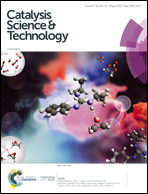Effect of calcination conditions on the performance of Ni/MgO–Al2O3 catalysts in the steam reforming of biomass fast pyrolysis volatiles
Abstract
A study was carried out to understand the influence of calcination conditions of a Ni/MgO–Al2O3 catalyst on its performance and stability in the reforming of biomass fast pyrolysis volatiles. Accordingly, the first calcination temperature subsequent to promoter impregnation on Al2O3 was modified from 900 to 700 °C. Subsequently, Ni was incorporated by impregnation and a second calcination was carried out at three temperatures (500, 600, and 700 °C). The performance of the different Ni/MgO–Al2O3 catalysts was evaluated in a bench-scale plant operating in the continuous regime, which comprised a conical spouted bed reactor for the pyrolysis step and a fluidized bed reactor for the in-line catalytic steam reforming step. The fresh catalyst was also characterized in order to establish the relationship between the catalyst properties and calcination temperatures at the synthesis step. Moreover, the deactivated catalysts were comprehensively characterized in order to ascertain the main causes of activity decay in the catalysts. Therefore, the catalyst calcined at the lowest temperature subsequent to both the impregnation steps (Ni500/MgO700Al2O3) exhibited the best performance at the reforming step, as the amount of spinel phase formed is lower, and therefore, the catalyst reducibility is increased, leading to higher reforming activity and stability with respect to time on stream.



 Please wait while we load your content...
Please wait while we load your content...